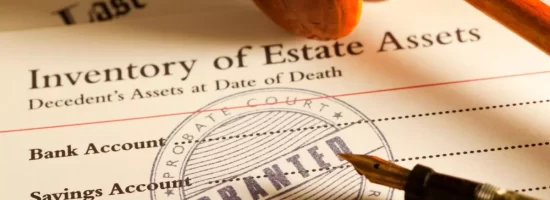
How Divorce Affects Estate Planning in California
Unfortunately, marriages sometimes come to an end. When this occurs and a couple agrees they want to dissolve their marriage, there are a variety of legal elements they’ll need to address. While a divorce may change your relationship and other aspects of your life immediately, documents such as your estate plan may not be fully changed or terminated just because your divorce was finalized.
It’s crucial to be aware of how a divorce can affect your estate plan here in California and what to do to protect yourself and your assets. Here’s what you might want to know about what happens to your estate plan when a divorce occurs.
What Happens to Your Estate Plan if You Get Divorced?
Every estate plan is unique to the individual or individuals who created it. Because of this, every estate plan can be altered a bit differently when a divorce occurs. In general, most aspects that leave important power or property to your former spouse will be revoked. However, varying aspects of an estate plan can have different modifications if you and your spouse divorce in California.
Wills
California law has some protections in place for divorcing individuals who may have mentioned their partner in their will. The law states that unless the creator of a will specifies otherwise, a finalized divorce “revokes the appointment of property” or gifts to the former spouse that were detailed while the couple was still together. That property would then either go to an alternate or residuary beneficiary listed in the will.
If there are no other listed beneficiaries and you decide not to update your will, the court is going to disperse the property based on California’s inheritance laws. If your former spouse was named as the executor and you don’t update your will before passing, the responsibility should be passed to the individual you named as alternate executor. However, your will is not terminated when a divorce occurs. Instead, there are likely going to be “holes” in it that you’ll need to adjust.
Trusts
It’s important to note that you cannot create new trusts while a divorce is pending, otherwise it may be considered hiding communal assets from your spouse. When a couple divorces, there are similar rules to those of wills where any “gifts” left to the former spouse are revoked. If you created a living trust during your marriage, this is the only form of trust that is immediately dissolved upon the finalization of a divorce. This occurs because the property that was put in a living trust may have been considered “communal,” meaning it must be divided during the divorce process. After it has been divided, it turns into separate property. It is not able to be in that same trust, and the “communal” property no longer exists.
Powers of Attorney
Wills and other pieces of estate plans prioritize assigning powers of attorney to ensure the creator is protected if they become incapacitated in any way. A healthcare power of attorney allows another individual to make important medical decisions on your behalf if you’re unable to, and a financial power of attorney gives another person the ability to take over your finances and make financial decisions on your behalf.
If your spouse was given any form of power of attorney and you end up divorcing, their privileges will be revoked when the divorce is finalized. However, it’s critical to update your estate plan to ensure you have a power of attorney you can trust if something ever happens to you.
How Can You Update Your Estate Plan After a Divorce?
After your divorce is finalized, you can edit your estate plan to better fit your current situation. If you created a will or estate plan with a qualified attorney, you can discuss your modification needs and work together to adjust your documents properly. Working with an experienced estate planning lawyer can help to ensure your changed plan addresses any holes that were created from your divorce, in addition to making sure it is all legally binding. If you are going through a divorce or were just recently divorced in Southern California, see how our team can help you.
FAQs
Q: Does a Divorce Revoke a Beneficiary Designation in California?
A: Yes. California law revokes most pieces of an estate plan that would provide the former spouse with substantial power or property. This includes gifts or assets left to them as a beneficiary.
Q: What Happens If You Have a Joint Will and Get Divorced?
A: If you and your former spouse created a will together in California and ultimately end up divorcing, you are going to want to scratch the old will and create a new one. This is because your will won’t automatically be dissolved when a divorce occurs, even if it was created jointly. It’s also likely your joint will listed property that was considered communal, and that property is no longer communal after your divorce is finalized.
Q: Can You Change Any Aspect of an Estate Plan During a Pending Divorce?
A: While you can’t modify every aspect of an estate plan during the divorce process, you still may try and make changes or even revoke documents such as a last will and testament.
Q: What Estate Planning Actions Can You Not Do During a Pending Divorce?
A: An individual cannot transfer assets through different financial institutions, attempt to hide them, or transfer ownership of them during a divorce. You also cannot create a new trust to put assets in or hide them in.
Estate Planning Modification in Vista
Forming an estate plan that fits your needs is essential. While a divorce can change some aspects of your plan, it doesn’t mean it’s completely ruined. At Paul V.L. Campo, Attorney at Law, our team has spent years helping clients create estate plans that make them feel comfortable and confident about their future. To learn more about how our team can help you modify estate planning documents after a divorce, contact us for more information.
Recent Posts
Does a Living Will Avoid - Jul 07, 2024
Law professionals qualified in estate planning often hear clients ask, “Does a living will avoid probate in California?” and other similar questions. This area of estate…
What Assets Are Exempt From - May 05, 2024
Probate is the legal process of settling the estate of a deceased person. It can be required by law if the value of the estate exceeds…
How Much Does an Estate - Mar 03, 2024
The death of a family member is a difficult challenge, from the intense emotions to the legal complexities. Dealing with legal processes after the death of…
Let’s be proactive
about your case.
Contact me to get started.
© 2025 Estate Preservation Group | Disclaimer | Site Map
The information you obtain at this site is not, nor is it intended to be, legal advice. You should consult an attorney for advice
regarding your individual situation. Contacting us does not create an attorney-client relationship.




